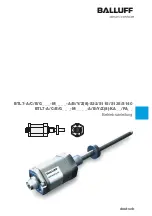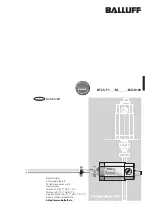
Installation and Operating Instructions
Duct and Outside Air Humidity (H200-H300)
4 to 20mA or 0 to 5V Humidity Output with Optional Temperature Sensor
Building Automation Products, Inc., 750 North Royal Avenue, Gays Mills, WI 54631 USA
Tel:+1-608-735-4800 • Fax+1-608-735-4804 • E-mail:[email protected] • Web:www.bapihvac.com
9938_ins_hum_temp_duct_out_5_20
2 of 4
rev. 02/15/18
Specifications subject to change without notice.
Wiring and Termination
Fig. 9:
Wiring Diagram
NOTE:
BAPI’s
2% and 3%, humidity transmitters
ARE
polarity sensitive as well as reverse polarity protected.
Table 1: Humidty Transmitter with 4 to 20mA Output
Wire Color Purpose
Note
White
Not Used
Not Used (Cap Wires)
Black
Humidity Output
4 to 20 mA, To Analog Input of Controller
Red
Power
10 to 35VDC
Table 2: HumidityTransmitter with 0 to 5VDC Output
Wire Color Purpose
Note
White
Humidity Output
0 to 5VDC, To Analog Input of Controller
Black
GND (Common)
Ground for Power and Humidity Output
Red
Power
10 to 35VDC or 12 to 27 VAC
Optional Temperature Sensor Output
See Table 3 above for Wire Colors
(Sensors are not polarity sensitive,
3 wires used for 3-wire RTDs)
Humidity Output
& Power
See Tables 1 and 2 above
for Wiring Information
1.8KΩ
Orange/Red
100Ω
Red/Red
2.2KΩ
Brown/White
1KΩ
Orange/Orange
3KΩ
Yellow/Black
3.25KΩ
Brown/Green
1KΩ
Green/Green
3.3KΩ
Yellow/Brown
10K-2Ω
Yellow/Yellow
2KΩ
Brown/Blue
10K-3Ω
Yellow/Red
10K-3(11K)Ω
Yellow/Blue
100Ω
Red/Red/Black*
20KΩ
White/White
1KΩ
Orange/Orange/Black*
47KΩ
Yellow/Orange
50KΩ
White/Blue
100KΩ
Yellow/White
Table 3: Temperature Sensor Lead Wire Colors
Nickel RTD
Silicon RTD
*In the 3-Wire RTD sensors listed above,
the two wires of similar color are
connected together.
Additional sensors are available so your sensor may not be listed on this table.
Thermistors
Platinum RTDs - 2 Wire
Platinum RTDs - 3 Wire
BAPI recommends using twisted pair of at least 22AWG and sealant filled connectors for all wire connections. Larger
gauge wire may be required for long runs. All wiring must comply with the National Electric Code (NEC) and local codes.
Do NOT run this device’s wiring in the same conduit as AC power wiring of NEC class 1, NEC class 2, NEC class 3 or with
wiring used to supply highly inductive loads such as motors, contactors and relays. BAPI’s tests show that fluctuating and
inaccurate signal levels are possible when AC power wiring is present in the same conduit as the signal lines. If you are
experiencing any of these difficulties, please contact your BAPI representative.
BAPI recommends wiring the product with power disconnected. Proper supply voltage, polarity, and
wiring connections are important to a successful installation. Not observing these recommendations may
damage the product and will void the warranty.






















